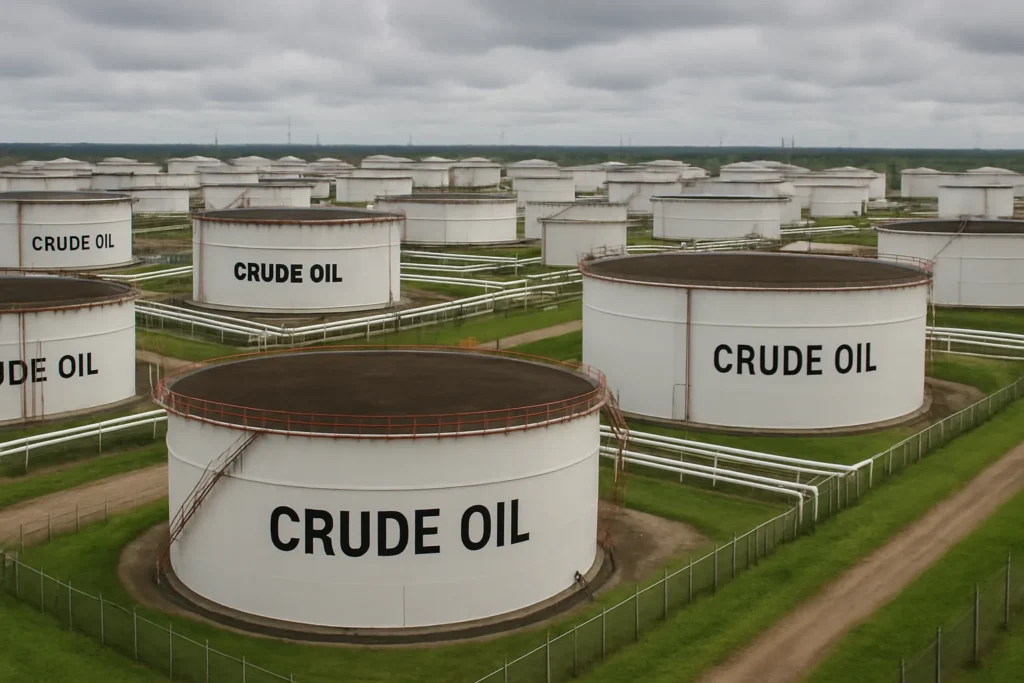An Unexpected Turn: Oil Inventories Defy Expectations
Picture the bustling trading floor of a Wall Street commodities desk: phones ring incessantly, monitors flash red and green, and everyone, it seems, is on edge. Just days ago, most energy analysts confidently predicted a continued drawdown in U.S. crude oil inventories, fueled by surging summer travel and steady manufacturing demand. But June’s final numbers upended those predictions. According to both the American Petroleum Institute (API) and the Energy Information Administration (EIA), U.S. crude inventories instead unexpectedly climbed by nearly 0.68 million barrels, ending a bruising four-week streak of declines.
This surprise influx sent tremors through financial markets—though you wouldn’t know it from glancing solely at oil prices. West Texas Intermediate crude for August edged up modestly, gaining just 34 cents to close at $65.45 a barrel, while Brent crude similarly notched a 37-cent increase. Why the muted reaction? Oil, after all, typically flinches at even the whiff of excess supply. The answer lies in a complex mix of market forces: an inventory report is only one slice of a shifting tableau that now includes easing geopolitical tensions and a still-fragile post-pandemic recovery.
Gasoline stockpiles, crucial for American drivers as summer travel peaks, posted a 1.9 million barrel increase. In contrast, distillate inventories—which include the diesel that powers heavy industry—fell by about 3.4 million barrels. The larger-than-expected build in crude supplies, coupled with these mixed signals on petroleum products, has left many investors wondering: Are we seeing the early signs of a slowdown in American economic activity, or just a temporary blip?
The Policy Puzzle: What’s Driving Demand Down?
Underneath the surface statistics lurk deeper policy questions. Conservative energy policies have often focused on boosting domestic production at the expense of long-term strategic planning. These policies, championed by some in Congress and industry lobbying groups, emphasize ramping up drilling and relaxing environmental regulations—ostensibly to lower prices and ensure “energy independence.” The short-term result may be plentiful barrels, but seasoned economists warn that this approach risks inflating supply even as demand growth falters.
A closer look reveals that chronic underinvestment in clean transportation infrastructure and efficiency standards has left U.S. oil demand more vulnerable to cyclical swings. According to Columbia University’s Center on Global Energy Policy, “robust fuel efficiency standards and investment in alternatives can insulate consumers and the broader economy from volatility in oil demand and supply.” Yet, progress in Washington has been patchy at best. The current inventory glut offers a tangible example of how a “drill, baby, drill” mindset can create supply overhangs, pressuring prices downward and, paradoxically, sowing more market instability.
“American energy policy too often swings between knee-jerk expansion and panicked contraction, ignoring the long-term stability found in a cleaner, more resilient energy system.”
Experts at the International Energy Agency (IEA) agree: diversification and demand-side policies—like electrifying transportation and bolstering mass transit—deliver far more stability than repeated booms and busts in crude inventories. If you get the sense that we’re stuck in a cycle of short-term thinking, you’re not alone. The challenge is moving beyond partisanship to embrace a smarter, forward-looking approach that recognizes the evolving realities of the global energy landscape.
Bigger Picture: Markets, Inflation, and the Middle Class
Market watchers know all too well that oil isn’t just another commodity—it’s entwined with broader economic health and consumer well-being. An inventory surge typically signals weaker demand, which can spell trouble for industries tied to energy, like manufacturing and logistics. Yet, for most American families, it can also mean a welcome reprieve at the gas pump, easing some pressure on household budgets stranded by stubborn inflation.
Recent history offers a cautionary tale. Recall the pandemic spring of 2020: a sudden drop in driving and air travel left U.S. crude stockpiles bloated, briefly sending oil futures negative. Prices later rebounded, but the whiplash proved just how closely U.S. economic fortunes are tethered to energy market gyrations. Today, as the Federal Reserve continues its battle against inflation, analysts like Harvard’s Jason Bordoff warn that unpredictable swings in oil inventories and prices can complicate this delicate balancing act. “Too much supply can temporarily ease gasoline prices, but if it’s coupled with falling demand, it’s actually a warning sign for the underlying economy,” Bordoff recently told Bloomberg.
What’s next? Savvy investors and policy advocates alike will keep a watchful eye on demand metrics—not just supply numbers. Potential global shocks, from renewed conflict in energy-producing regions to abrupt changes in monetary policy, loom large. At the same time, the U.S. energy sector faces a reckoning: Will it cling to reactive, extraction-driven strategies that primarily benefit oil giants and stock speculators, or will it chart a more sustainable path that delivers stability for all?
The future of American energy security doesn’t hinge solely on the volume of oil stored in underground tanks. According to a recent Pew Research study, “a clear majority of Americans favor expanding investments in renewables, strengthening fuel efficiency, and creating jobs in sustainable industries.” Ultimately, policies grounded in equity, environmental responsibility, and economic resilience will best serve families and markets—no matter what next week’s inventory report brings.

